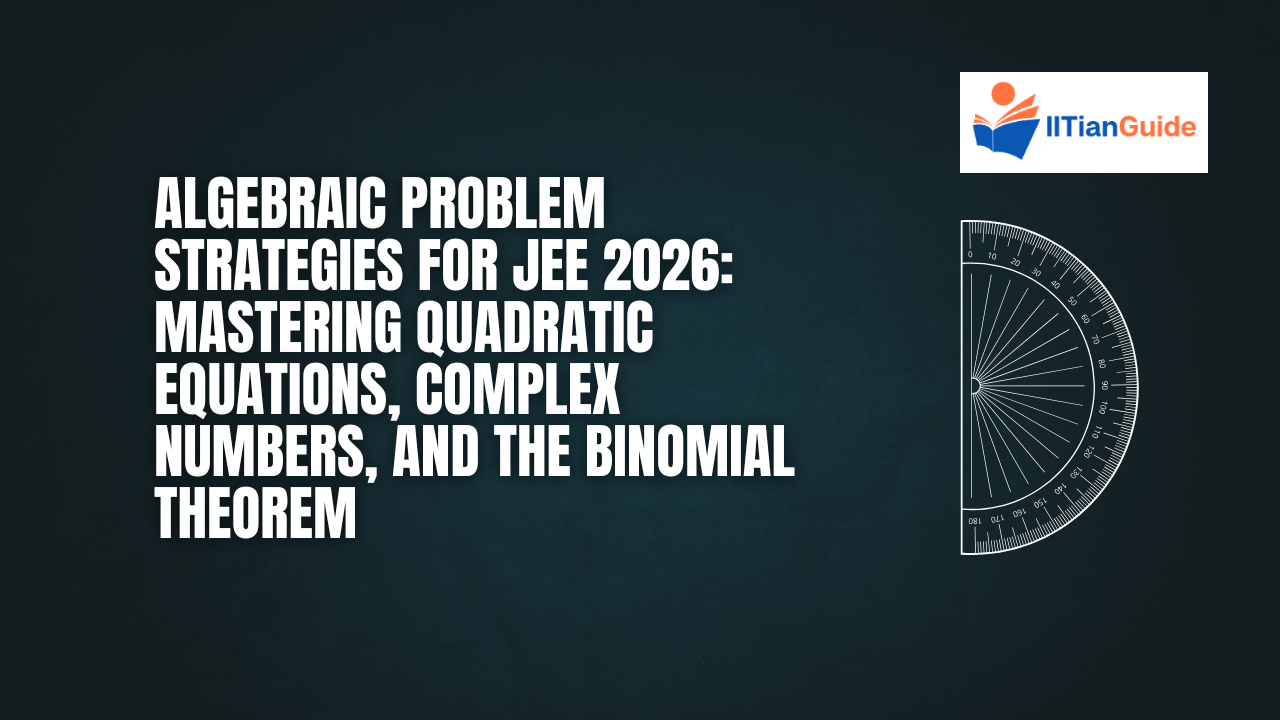Algebraic Problem Strategies for JEE 2026: Mastering Quadratic Equations, Complex Numbers, and the Binomial Theorem

Algebra plays a decisive role in JEE 2026 preparation. Topics like quadratic equations, complex numbers, and the binomial theorem often appear in high-scoring sections of both JEE Main and JEE Advanced.
Strong command over these areas allows students to solve problems quickly and accurately.
This blog will break down effective strategies, provide problem sets, and explain how to approach these topics for maximum score in JEE 2026.
1. Why Algebra is Crucial for JEE 2026
In the JEE syllabus, algebra is a high-weightage topic. Questions can be direct formula-based or combined with concepts from calculus, coordinate geometry, and trigonometry.
Since algebra questions often require fewer steps than lengthy calculus problems, mastering them gives you more time for other sections.
2. Strategies for Quadratic Equations in JEE 2026
Quadratic equations are a scoring topic if you understand roots, discriminants, and factorisation.
Key Areas to Focus On
- Standard form: ax2+bx+c=0
- Nature of roots: Discriminant D=b2−4ac
- Sum and product of roots: α+β= −b/a, αβ = c/a
- Transformations: Shifting roots, new equations from given roots.
- Inequalities: Quadratic inequalities and sign charts.
Pro Tip: In JEE Advanced, inequalities are often merged with functions, so practise sign analysis.
Sample Problems:
|
Problem |
Hint |
|
If x2−5x+6=0, find the roots. |
Factorise directly. |
|
Solve 2x2−3x+1>0. |
Use discriminant and sign chart. |
|
If roots differ by 2, find the equation given sum of roots is 8. |
Use sum and product relations. |
3. Strategies for Complex Numbers in JEE 2026
Complex numbers link directly to trigonometry and geometry in JEE.
Key Areas to Focus On
- Standard form: z=x+iy
- Modulus and argument: ∣z∣=√x2+y2, arg(z)=tan−1(yx)\arg(z) = tan-1(y/x)
- Conjugates: z =x−iy
- Polar form: z=r(cosθ+isinθ)
- De Moivre’s theorem: Expansion and root finding.
Pro Tip: Many JEE Advanced problems use locus of complex numbers, so practise converting modulus/argument equations into geometric shapes.
Sample Problems:
|
Problem |
Hint |
|
Find modulus and argument of 3+4i. |
Direct formula. |
|
Solve z2+1=0. |
Roots are ±i. |
|
Find cube roots of unity. |
Use De Moivre’s theorem. |
4. Strategies for Binomial Theorem in JEE 2026
The binomial theorem is a chapter where memorising formulas is not enough — application is key.
Key Areas to Focus On
- General term: Tr+1=(n r)an−rbr
- Middle term(s) for even/odd nn
- Term independent of x in expansions
- Approximation using binomial expansions (small x cases)
Pro Tip: In JEE Advanced, terms can be given indirectly, and questions often involve ratios or sums of coefficients.
Sample Problems:
|
Problem |
Hint |
|
Find the 5th term in (2x+3)6. |
Use general term formula. |
|
Find term independent of x in (x2+1x)6. |
Make exponent zero. |
|
Approximate (1.02)5. |
Use (1+x)n with x=0.02. |
5. How to Practise for Maximum Retention
- Solve 10–15 problems daily from each topic.
- Maintain a formula sheet for quick revision.
- Include mixed problem sets combining quadratic equations, complex numbers, and binomial theorem.
- Time yourself — JEE success depends on speed.
6. Combined Problem Set for JEE 2026
|
No. |
Problem |
|
1 |
If the roots of x2+px+q=0 are reciprocals, find q. |
|
2 |
Find coefficient of x5 in (1+x)10. |
|
3 |
If α and β are roots of 2x2−3x+4=0, find α3+β3. |
|
4 |
Find sum of coefficients in (2−3x)7. |
Conclusion
Mastering quadratic equations, complex numbers, and the binomial theorem can significantly boost your JEE 2026 score.
These chapters demand consistent practice, sharp problem-solving skills, and the ability to combine concepts.
Start with basics, solve advanced problems, and revise regularly for the best results.
Frequenty Asked Quesstions (FAQs)
Q1. How much weightage do these topics have in JEE 2026?
A: Combined, these topics can carry 20–25 marks in JEE Main and slightly more in JEE Advanced.
Q2. Which topic should I start with?
A: Start with quadratic equations, then move to complex numbers, and finally binomial theorem for smoother progression.
Q3. Should I memorise formulas or understand concepts?
A: Both are essential — understanding helps you apply, and memorising ensures speed in exams.
Q4. How can I prepare for JEE Advanced-level problems?
A: After mastering NCERT and coaching materials, practise from past JEE Advanced papers and IIT-level problem books.

